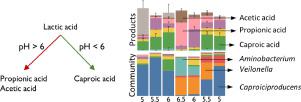Water Research ( IF 11.4 ) Pub Date : 2020-09-07 , DOI: 10.1016/j.watres.2020.116396 Pieter Candry 1 , Ljubomir Radić 1 , Jorien Favere 1 , Jose Maria Carvajal-Arroyo 1 , Korneel Rabaey 2 , Ramon Ganigué 2

|
Carbohydrate-rich waste streams can be used for bioproduction of medium-chain carboxylic acids (MCCA) such as caproic acid. The carbohydrates in these streams can be converted to lactic acid as the initial fermentation product, which can then be fermented to MCCA by chain elongation. In this process, chain elongators compete for lactic acid with other bacterial groups that, for instance, ferment lactic acid to propionic and acetic acid. Understanding the drivers that control the competition between these two pathways is essential to maximizing MCCA production. This study aimed to investigate the competition between chain elongating and propionic acid producing organisms as a function of operational pH. Operation of long-term lactic acid fermenting reactors with varying pH values showed that pH values above 6 resulted in a propionic acid producing community dominated by Veillonella and Aminobacterium. At pH values below 6, the community moved towards chain elongation, with communities dominated by Caproiciproducens. Short-term incubations showed that rates of lactic acid consumption were strongly reduced at pH below 6 (7.7 ± 1.2 mM lactic acid·h−1 at pH 6.5; 0.74 ± 0.33 mM lactic acid·h−1 at pH 5.5). Similar to observations in long-term reactors, when a chain elongating community adapted to pH 5.5 was used for short-term incubations at pH 6.5, propionic acid was the dominant product. The results of this study show that pH below 6 stimulate lactic acid chain elongators through kinetic effects, and potentially improved energetics, providing a tool for microbial management of MCCA-producing systems.
中文翻译:

在乳酸发酵过程中,温和的酸性pH值会选择通过其他途径延长至己酸的链延长。
富含碳水化合物的废物流可用于生物生产中链羧酸(MCCA),例如己酸。这些流中的碳水化合物可以转化为乳酸,作为初始发酵产物,然后可以通过链延长将其发酵为MCCA。在此过程中,扩链剂与其他细菌竞争竞争乳酸,例如,将乳酸发酵为丙酸和乙酸。了解控制这两种途径之间竞争的驱动因素对于最大化MCCA产量至关重要。这项研究旨在研究链伸长和丙酸生产生物之间的竞争与运行pH的关系。Veillonella和氨基细菌。在pH值低于6时,群落朝着链延长的方向发展,而群落则由己生菌主导。短期温育表明,在pH低于6时,乳酸的消耗速率大大降低(pH 6.5时为7.7±1.2 mM乳酸·h -1; pH为0.74±0.33 mM乳酸·h -1在pH 5.5)。与长期反应堆中的观察结果相似,当将适应pH 5.5的链延长社区用于pH 6.5的短期培养时,丙酸是主要产物。这项研究的结果表明,低于6的pH值会通过动力学效应刺激乳酸链延长剂,并可能改善能量,为MCCA生产系统的微生物管理提供了一种工具。











































 京公网安备 11010802027423号
京公网安备 11010802027423号